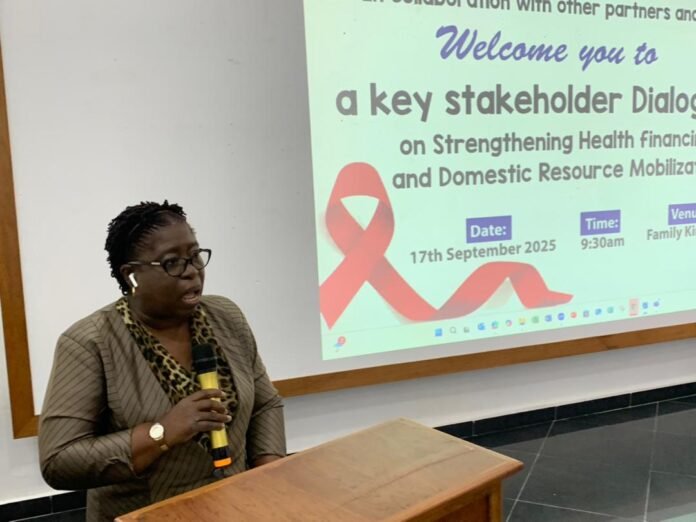In response to escalating global health funding reductions, the AIDS Healthcare Foundation Sierra Leone (AHF-SL) has issued a compelling call for strengthened domestic health financing and resource mobilization. The foundation’s urgent appeal came during a strategic engagement with partners and civil society organizations on Wednesday, September 17, 2025.
The Africa Health Strategy 2016-2030 recognizes that sustainable and predictable health financing is essential for building viable systems and achieving Universal Health Coverage (UHC), according to an AHF representative. She recalled that in February 2019, the African Union convened the African Leadership Meeting on Investing in Health, which brought together Heads of State and Government alongside regional and global leaders. That landmark meeting produced the Addis Ababa Commitment towards Shared Responsibility and Global Solidarity for Increased Health Financing, now widely known as the ALM Declaration.
At the heart of this Declaration are three fundamental commitments: increasing domestic resources for health, sustaining dialogue between Ministers of Health and Finance, and aligning partner and private sector investments with continental priorities. Since its launch, National Dialogues on Health Financing have become evidence-based platforms for consensus-building and reform.
The representative emphasized that effective health financing serves as the foundation for a functioning and equitable health system, noting that health financing involves not just spending money, but building alliances. She called for stronger commitment to increasing domestic health budgets, specifically referencing the Abuja Declaration commitment of allocating at least 15% of national budgets to health.
In his statement, UNAIDS Strategic Information Adviser, Semion A. T. Saffa-Turay described the event’s theme, “Strengthening Health Financing with Emphasis on HIV and AIDS,” as both timely and critical as Sierra Leone collectively strives to build resilient and equitable health systems. He characterized effective health financing as not merely a technical issue but a matter of social justice, explaining that it determines whether the most vulnerable populations can access life-saving services, including HIV prevention, treatment, care, and support.
He pointed to the global HIV crisis in 2025 as creating urgency for addressing sustainability, noting that massive funding cuts have created a systemic shock to the HIV response. These cuts have triggered significant disruptions to treatment and prevention programmes worldwide, particularly in high-burden, low-income African countries.
Despite these challenges, Turay reported that governments and communities are stepping forward and assuming greater responsibility. He revealed that low- and middle-income countries already provide 59% of HIV funding to their own responses, with 25 countries currently working with UNAIDS to increase their domestic HIV funding for 2026. However, he cautioned that these efforts remain insufficient to replace lost aid, emphasizing that a new financing approach is essential to maintain progress.
Saffa-Turay welcomed steps taken at the Sevilla Financing for Development Conference to address Global South debt and aggressive tax avoidance, describing these measures as essential to unlocking fiscal space for health needs including HIV. He highlighted South Africa as a leading example, with 80% of its HIV response funded domestically.
Addressing recent developments in HIV treatment, he mentioned a new HIV prevention drug approved by the FDA that is administered every six months with near 100% efficacy. However, he raised serious concerns about pricing issues, noting that manufacturer Gilead’s price exceeds $28,000 per year while experts estimate the drug could be produced for $25 per year. He issued a call to action for pressure on Gilead to license generics and reduce prices, while mobilizing Global Fund, PEPFAR, UNITAID, and civil society alliances. He expressed encouragement at PEPFAR’s commitment to support procurement and urged continued collaboration with governments and communities to overcome the current crisis.
In his presentation, Dr. Abdul Jibril Njai, Senior Health Financing Specialist, Health Economist, and Health System Specialist at the Ministry of Health’s DPPI, explained that the objective of domestic resource mobilization calls for access to essential services, financial protection, equity in access to health, and quality in service delivery. He noted that traditional health financing includes government revenue, donor funding, out-of-pocket payments, private sector contributions, and community-based organizations.
National AIDS Secretariat (NAS) Director General Abdul Raman Sesay commended AHF for what he described as a step in the right direction. He called for enhanced coordination and partnership to achieve set objectives in the national response, emphasizing the need to review various presentations and identify gaps. He praised AHF’s efforts in raising awareness about health financing and acknowledged other partners for their support.
As a demonstration of commitment from present partners and government officials, the event featured a panel discussion that provided insights on multiple aspects of health financing. AHF Regional Policy Advocacy Manager Dina Tibesigwa offered perspective on the global health financing situation, while the NAS Director General addressed strategic coordination and implementation of HIV programs within the national health financing framework.
The discussion also included analysis of the legislative role in health financing by Honorable Tamba Simon Johnny, Deputy Chair of the Parliamentary Oversight Committee, alongside examinations of the role of local councils by Unisa Mnasaray, and the role of civil society organizations by Idrissa DM Songo from NETHIPS.
The gathering represented a significant step toward addressing Sierra Leone’s health financing challenges through collaborative action and increased domestic investment in the health sector.
By Komba Fillie




